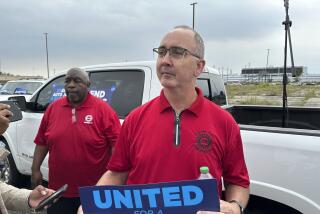Obama vows to take passive role
- Share via
WASHINGTON — President Obama said Monday that the U.S. government had no interest in taking an ownership stake in General Motors Corp. But faced with two other bad options -- letting the legendary automaker fail or simply extending more government loans that would add to the company’s strangling debt burden -- he had no choice.
“Piling an irresponsibly large debt on top of the new GM would mean simply repeating the mistakes of the past,” Obama said. “So we are acting as reluctant shareholders because that is the only way to help GM succeed.”
Obama admitted his decision to pump an additional $30.1 billion in taxpayer money into GM and to take a 60% ownership stake “may give some Americans pause.” But Obama and top administration officials said the move was a necessary evil. And they vowed to keep that evil in check.
Steve Rattner, head of Obama’s auto task force, said the group was not involved in GM’s major restructuring decisions, such as which plants to close. And he vowed it would not get directly involved in GM’s operations when the new company emerges from bankruptcy. The administration has described the government’s new role as “passive investors.”
Rattner, a former Wall Street private equity investor, said the task force used that sector’s model in assessing GM’s situation in an arduous 60-day process.
“We have worked with them on their restructuring plans, . . . but we have not designed them,” he said. “We don’t feel that we are the ones in any industry, including cars, who should be making decisions . . . normally and appropriately left to management.”
But Obama’s decision to take the unprecedented step of assuming ownership of a major manufacturing company opened him up to sharp criticism that he was nationalizing the automaker. The Republican National Committee quickly dubbed the company “Government Motors.”
“No matter how much the president spins GM’s bankruptcy as good for the economy, it is nothing more than another government grab of a private company and another handout to the union cronies who helped bankroll his presidential campaign,” Republican National Committee Chairman Michael Steele said.
The U.S. Chamber of Commerce also said it was concerned about Obama’s move, promising to “expose and fight any counterproductive influence by government, unions or politicians over decisions that should be left to management.”
Obama directly rejected criticism from some small bondholders that the United Auto Workers union received a more generous deal in exchange for giving up some of the debt GM owes to a retiree healthcare trust.
But Mark Modica, 48, business manager at a Saturn dealership in Doylestown, Pa., said he thought the UAW did better than small bondholders like him. He rejected the final debt-for-equity offer made by GM in conjunction with the Obama administration last week because it did not offer an acceptable return on the $150,000 worth of GM bonds he bought two years ago.
“We have retirees on our side who are losing their retirement, but it seems like the retirement of the people in the union is being protected,” he said. “I don’t think there’s a doubt there was preferential treatment.”
Despite Obama’s vow to be a hands-off investor, the government’s majority interest in GM opens up the White House to political pressures on key company decisions. The auto task force has already been lobbied by some members of Congress who want to keep GM plants in their districts open.
Other legislators are pushing back against the plans by GM and Chrysler, which the administration also forced into bankruptcy, to ax hundreds of dealers. On Wednesday, the Senate Commerce Committee will hold a hearing on the dealership cuts, calling GM Chief Executive Fritz Henderson and Chrysler President James E. Press to testify.
But the Obama administration said its ownership of GM won’t extend to operational decisions. Those will be left to the company’s board, a majority of which the administration will choose from seasoned business executives.
“No plant decisions. No job decisions. No dealer decisions. No color-of-car decisions. Those are all going to be left for management,” Rattner said. “We think that getting involved in day-to-day matters, first, is not our core competency, and second, is subject to enormous peril of political interference. And so it is simply easier to draw a very thick, firm black line than to start dealing in shades of gray.”
Obama drew that line Monday.
“What we are not doing -- what I have no interest in doing -- is running GM,” he said. “GM will be run by a private board of directors and management team with a track record in American manufacturing that reflects a commitment to innovation and quality. They -- and not the government -- will call the shots and make the decisions about how to turn this company around.”
Rattner said GM would emerge from bankruptcy a private company and become public again in 12 to 18 months. The government expects to sell its shares in a series of transactions over time to maximize the return.
“Obviously we could exit tomorrow if we wanted to by handing out shares at the corner of Pennsylvania and 17th (a block from the White House) or selling them for a dollar, but we have a huge amount of taxpayer money here,” he said.
“But while we want to exit as soon as possible, we also want to exit as soon as practicable in terms of being good custodians of the taxpayers’ money.”
--







